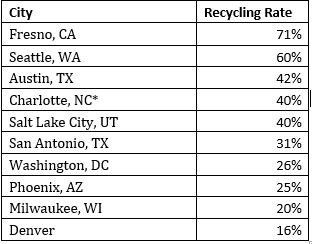Danny Katz
Executive Director, CoPIRG
Executive Director, CoPIRG
DENVER, COLORADO—Denver’s poor recycling rates place Colorado’s capitol city among the most wasteful cities in the nation, according to a report released today by nonprofits CoPIRG and Eco-Cycle. The analysis comes as hundreds of civic leaders gather for Mayor Hancock’s 2nd annual Sustainability Summit that will tackle recycling and materials management among other topics.
Just one day before America Recycles Day as well as the Summit, the report highlights the city’s abysmal recycling rates and recommends ways to transform the city’s waste management system. According to the report, Denver only recycles 18 percent of the waste from single-family homes and small apartments, one of the worst rates in Colorado as well as among peer cities across the country. In addition, many residents in large multi-unit apartment buildings lack access to the most basic component of recycling – the purple recycling bin.
“Today city leaders are coming together to discuss sustainability in Denver,” said Danny Katz, Director of the advocacy group CoPIRG and a coauthor of the report. “Unfortunately, when it comes to recycling, there is little to celebrate. Denver has one of the worst recycling rates in the country, and many of the city’s current policies make it difficult for residents to do the right thing.”
“The good news is that Mayor Hancock recognizes that Denver can and should do more to make Denver truly sustainable,” said Kate Bailey, Eco-Cycle Solutions Director and coauthor of the report. “The city has recently taken steps to improve its waste diversion, such as adding compost routes. We look forward to working with Mayor Hancock and the City Council to make big improvements in the next few years,” she added.
The CoPIRG/Eco-Cycle report compared Denver’s recycling rate to Colorado cities along the Front Range and found Denver near the bottom of the list. Cities including Boulder, Louisville, Longmont, Fort Collins, Golden, and Loveland all have recycling rates that are two to three times higher than Denver’s 18 percent.
The report also compared Denver to peer cities across the country and found a similar pattern – Denver is at the back of the pack. For example: Salt Lake City, Utah; Charlotte, North Carolina; and Austin, Texas, have recycling rates that are twice that of Denver’s rate.
Residential Recycling Rates, Peer Cities with Municipally Run Trash and Recycling Services

*Includes Mecklenburg County
“Poor recycling programs have a negative impact on the community,” said Katz. “It means we’re creating landfills, like the Superfund-designated Lowry Landfill, full of toxic soup that will take millions of dollars to maintain. It means Denver misses out on millions of dollars of valuable recycling materials. It means Denver contributes to an inefficient production system that produces unnecessary amounts of energy and creates unnecessary amounts of pollution,” he added.
Denver residents clearly want more recycling and composting services. Recent surveys commissioned by the city found that:
“While Denver may not be providing the kind of recycling programs that residents want and that would benefit our economy, public health, and the environment, the city has an opportunity to realize huge increases in our recycling rate relatively quickly,” said Eco-Cycle’s Bailey. “The city should act swiftly to ensure that every household has a purple recycle bin and a green compost bin and to change the way trash services are priced to encourage people to recycle and compost more.”
REPORT RECOMMENDATIONS:
With Denver’s annual Sustainability Summit on Monday and America Recycles Day on Tuesday, CoPIRG and Eco-Cycle also urged Denver residents to get involved.
“People should take advantage of the programs that Denver does offer. If you don’t have a purple recycling bin, call the city to get one. Enroll in the compost program and for ten dollars a month get a green bin that can help reduce your waste stream by 50 percent. If you live in an apartment building that doesn’t offer recycling call your landlord and let your City Council member and the Mayor know,” said Katz.
“And don’t forget, recycling is only as effective as we make it. So know what can and cannot go in the recycling and compost bins. Also, shop smart and avoid purchasing some of the most common sources of trash including coffee cups, plastic water bottles and grocery bags. Invest in some reusable mugs, canteens and tote bags. Ultimately, we can do a lot to energize Denver into action that will help our health and the planet.”
The full report can be downloaded HERE or at www.ecocycle.org/take-action/denver